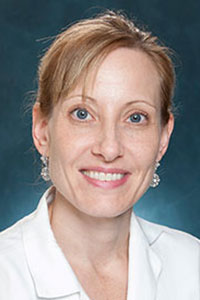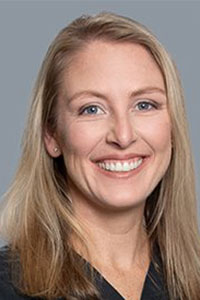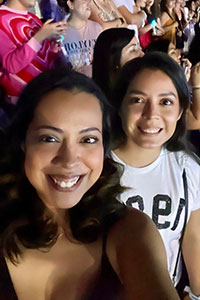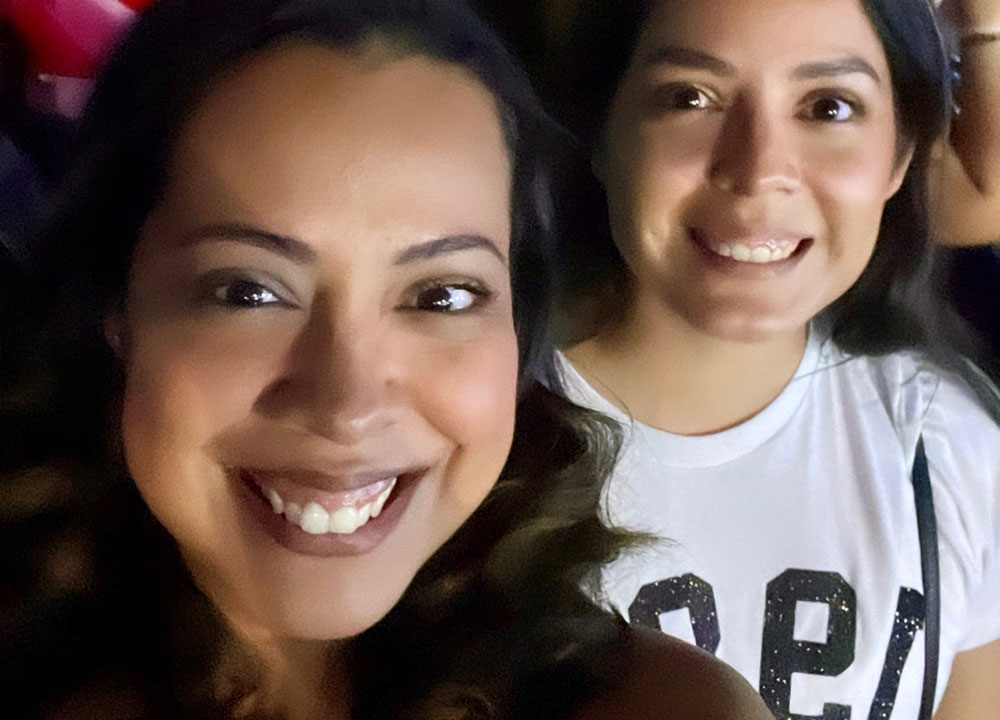A first-generation American, Alejandra Perez, 35, grew up in McAllen, Texas with her mom and two older sisters. Only two years apart, Alejandra and her sister Perla have been best friends their whole lives. As they grew up, Alejandra moved to Austin while Perla settled in Houston, but the two remain in frequent contact.
On Easter weekend in 2023, Alejandra went to Houston to spend time with her sisters and mother. While she was there, she noticed some pain in her left breast, so she did a self-exam and consulted with her mom and sister, who encouraged her to get it checked out.
That Monday, Alejandra called her OBGYN who referred her for screening. Before she knew it, she was getting a mammogram; she remembers thinking that something might be wrong when her care team took more pictures of her left breast than her right.
On May 5, 2023, a biopsy confirmed that she had breast cancer. Alejandra was only 33 years old and had no known family history of breast cancer, so she was shocked to learn that her cancer was BRCA2 positive. The CDC estimates that women with the BCRA2 gene have a 50% risk of developing breast cancer by age 70, compared to only 7% of women at average risk.
‘Life Changed in an Instant‘

medical oncologist at
Texas Oncology–Round Rock
Alejandra was swiftly referred to Beth Hellerstedt, M.D., medical oncologist at Texas Oncology–Round Rock, where she learned of her treatment options and came up with a game plan. Dr. Hellerstedt also recommended that the women in Alejandra’s family be tested for the BCRA2 gene, so that they can better understand their risk.
While spending time with Alejandra in Austin at the beginning of her diagnosis, her sister and mother received genetic testing for BCRA2 through Texas Oncology’s Genetic Risk Evaluation and Testing (GREAT) Program. Thankfully, her mother and oldest sister tested negative, but Perla tested positive for the BCRA2 gene.
Alejandra’s care team moved quickly; she began five months of chemotherapy on May 30 – just a few weeks after her initial diagnosis.
“Because of the genetic tools that allow us to accurately predict which patients will benefit from chemotherapy, we were able to adjust the schedule to Alejandra’s advantage. By treating her before the surgery, we had information about how she as an individual responded to treatment, which then allows us to better predict her future risk,” said Dr. Hellerstedt.
In mid-June, Alejandra learned that Perla, who was 36 years old at the time, was diagnosed with stage Ib BCRA2 breast cancer. After undergoing a double-mastectomy, Perla began chemotherapy and radiation treatment close to her home at Texas Oncology–Kingwood.
“I was heartbroken for my sister. It was very hard not being able to be there with Perla while she underwent treatment,” said Alejandra. Though she couldn’t be in Houston with Perla to help her through treatment, Alejandra kept in close contact with her sister, giving her invaluable tips and advice to help manage the side effects of treatment.
Alejandra completed chemotherapy in October and met with Julie Sprunt, M.D., breast surgeon at Texas Breast Specialists–Austin Midtown and Bastrop to understand her surgical options. On Nov. 7, Alejandra received a bilateral mastectomy.
“Once we knew results of genetic testing, bilateral mastectomies made the most sense for Ms. Perez, since her risk of developing a second breast cancer over the next 20 years with a BRCA2 mutation is approximately 25%,” said Dr. Sprunt. “Fortunately, breast reconstruction and surgical techniques to spare skin and nipples allows for improved cosmesis following bilateral mastectomies.”
Because of the advanced nature of her cancer, she was a candidate for radiation after her mastectomy, which she completed in six weeks.
‘It really takes a toll on mental health’

at Texas Breast Specialists–Austin
Midtown and Bastrop
Alejandra said she struggled with the mental health effects of cancer treatment, something many cancer patients say they’re not prepared for. “It really takes a toll on one’s mental health, especially women. You sometimes don’t feel feminine enough, because your hair and breasts can get stripped away, and it can impact your decisions about having children. You need someone to talk to, to help you navigate those hard issues.”
Alejandra said she was thankful for Texas Oncology’s ability to provide holistic patient care, including support for emotional and sexual health for cancer patients. She said she wants to encourage patients to advocate for themselves and encourage more cancer care teams to see the big picture, treating the whole patient, not just the disease.
“Every body has a story, and mine is resilience,” Alejandra said.
Advocating for Breast Cancer Screenings
Now, Alejandra is finished with treatment and her cancer is under control. She is being monitored to ensure it does not begin growing again.
Alejandra and Perla say they want to encourage more Hispanic patients to get their regular health screenings, including mammograms. “Latinos don’t go to the doctor until something is wrong,” Perla said. Alejandra said she wants more people to know about breast cancer risk assessment and prevention tools available, including regular mammograms and clinical breast exams. Utilizing them could save lives.
‘My Sister Saved My Life’

attend a Taylor Swift concert
just before their cancer diagnoses.
Alejandra had hoped that she would be the only one in her family with breast cancer. “I’m the only one without kids, so I felt like it would be easier for me go through it because I don’t have to worry about taking care of a family, while also managing treatment,” she said.
However, her sister Perla, has a different point of view, sharing, “My little sister saved my life.” Perla knows the importance of early detection and believes that her cancer would have been found much later had she not gone through genetic testing after Alejandra’s diagnosis.
Alejandra has much to look forward to now that treatment is over; she got engaged in December of 2023, and her wedding is planned for July of next year. She can’t wait to walk down the aisle and celebrate with her sisters by her side.
In 2024, Texas is expected to have 21,269 new cases of breast cancer and 3,571 deaths. For more information, visit TexasOncology.com.


